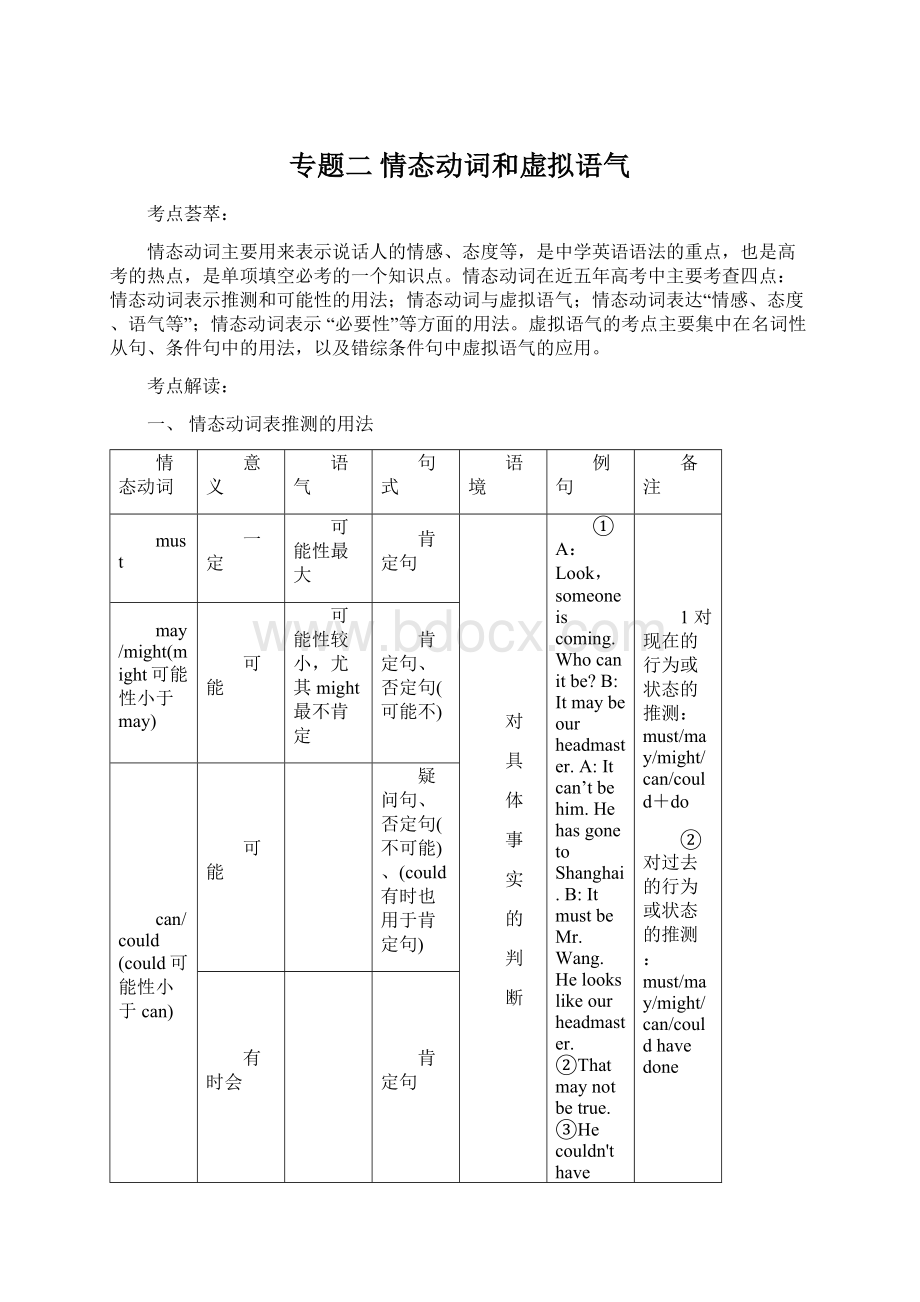专题二 情态动词和虚拟语气Word下载.docx
《专题二 情态动词和虚拟语气Word下载.docx》由会员分享,可在线阅读,更多相关《专题二 情态动词和虚拟语气Word下载.docx(21页珍藏版)》请在冰豆网上搜索。

Itcan’tbehim.HehasgonetoShanghai.B:
ItmustbeMr.Wang.Helookslikeourheadmaster.②Thatmaynotbetrue.③Hecouldn'
thavediscoveredthetruth.
1对现在的行为或状态的推测:
must/may/might/can/could+do
②对过去的行为或状态的推测:
must/may/might/can/couldhavedone
may/might(might可能性小于may)
可能
可能性较小,尤其might最不肯定
肯定句、否定句(可能不)
can/could(could可能性小于can)
疑问句、否定句(不可能)、(could有时也用于肯定句)
有时会
肯定句
should/oughtto
应该,理应
理论上
①It'
s8o'
clocknow.Heshouldbeintheofficenow.
②Hi,Mum!
I'
monthebus.Ishouldbehomeinabouttenminutes.
常表示在一段时间内可能发生的事或某人的期望。
一般句末有时间状语,或有语境暗示。
所表示的猜测发生的可能性很大。
注意:
should(oughtto)表示推测是高考考查的重点和难点。
如:
—WhencanIcomeforthephotos?
Ineedthemtomorrowafternoon.
—They________bereadyby12:
00.
A.canB.shouldC.mightD.need
【解析】B A项表示推测时常用于否定句和疑问句中。
C项表示推测语气不太肯定。
should意为“按理说,理应”,既回答了顾客的询问,不失礼貌,又为照片有可能尚未洗好,顾客到时取不到留下了回旋的余地,体现了店主的精明与用词经过仔细推敲。
二、情态动词的其他用法
1.can,could,may,might
情态动词
can/could
能力
①Icanseesomebirdsflyinginthesky.
②Couldthegirlreadbeforeshewenttoschool?
could表示泛指过去的某一能力。
表示过去有能力并且成功地做了某事,通常用was/wereabletodo,相当于managedtodo/succeededindoing。
Becausehepractisedhard,hewasabletopassthedrivingtest.
允许(有时可与may互换)
Can/MayIhavealookatyourphotos?
can与could、may与might不表时态差异,只是语气上的差别,could/might比can/may更委婉。
注意在回答时不能用could/might。
请求
—Can/Couldyoulendmeahand?
—Yes,Ican.
may/might
允许或请求
①Youmaytakethisifyoulike.
②May/MightIaskforaphotoofyourbaby?
2.must,should
must
必须
①Wemusthelpeachothertoovercomethedifficulties.②—MustIfinishtheworktoday?
—No,youneedn'
t/youdon'
thaveto./Yes,youmust.③Youmustn'
ttakephotoshere,anditisforbidden.
①must表示主观意志,haveto表示客观。
Theyhadtospeedup,fortheweatherturnedterrible.②MustI/we…?
的否定回答不能用mustn'
t。
偏要
硬要
非要
①Whymustyoualwaysinterruptme?
②—CanIborrowyourcar,Mum?
—Ifyoumust.
表示与说话人愿望相反及不耐烦。
should
应该(常与oughtto通用)
Youshouldbepolitetotheold.
oughtto的否定式:
oughtnotto(oughtn'
tto);
疑问式:
Ought…to…?
竟然
Itisstrangethatheshouldreactinthisway.
表示惊讶、意外等语气。
万一
①Shouldanyonephone,tellthemIwillcallbacklater.(=Ifanyoneshouldphone…)②IfIshouldgotheretomorrow,Iwouldgotoseeher.
用于if从句中强调“万一”,或用于虚拟语气。
3.need,dare
注意事项
need
①Ineedn'
tgoatonce.
②—Needyougoatonce?
—Yes,Imust./No,Ineedn'
t.
①need可以作实义动词,用于各种句式。
Ineedtogoatonce.Idon'
tneedtogoatonce.—Doyouneedtogoatonce?
—Yes,Ido.②need作情态动词常用于否定、疑问或条件句中。
dare
①Hedaren'
tcrosstheriver.②Howdareyousaythattome?
dare和need一样,既可以作情态动词,也可用作实义动词。
用作情态动词时,主要用于否定句、疑问句和条件句。
用作实义动词时,可用于各种句式。
Hedidn'
tdare(to)gooutaloneatnight.(在否定句中to有时可省略)
4.shall/will/would
shall
表示征询意见。
ShallIhelpyou?
用于第一、第三人称疑问句中。
表示说话人的意愿,有“命令,允诺,警告,决心”等意思。
①YoushalldoasIsay.(命令)
②Youshallhavethebooktomorrow.(允诺)
③Ifyoudon'
tgetout,Ishallknockyoudown.(警告)
用于第二、第三人称。
will/would
表示意愿
①Iwilldoeverythingforyou.②Noneissoblindasthosewhowon'
tsee.
表请求
Will/Wouldyoupleaseclosethewindow?
用于疑问句中。
would更委婉
表示某种倾向或习惯性动作
①Fishwilldiewithoutwater.②Everytimeshewasintrouble,shewouldturntohimforhelp.(would指过去某一段时间的情况,常与表示过去的时间状语连用,意为“总是,总会”,后面只能接动作性的动词。
)
usedto表示与现在的情况相反,表示“过去如此而现在不再这样”。
其后既可接表动作的动词,也可接表状态的动词。
Thereusedtobeanappletreeinfrontofthehouse.
表示功能(能,行)
①Ifyoudon'
thaveapen,apencilwilldo.②Wetriedthedooragain,butitwouldn'
topen.
与否定词连用常表示“拒绝”。
表示推测(可能、大概)
①Thiswillbethehouseyouarelookingfor.②Iwouldbeabouttenwhenmyfatherlefthome.
二、情态动词+havedone
musthavedone;
may/mighthavedone;
can/couldhavedone
一定(肯定句);
可能(肯定句和否定句);
可能(疑问句和否定句)
Youcan'
t/couldn'
thavemetmygrandmother.Shediedbeforeyouwereborn.
对过去的事情的推测
mighthavedone;
couldhavedone;
wouldhavedone
本来可能做……而未做;
本可以做……而未做;
本来会做……而未做
①Hemighthavegivenyoumorehelp,eventhoughhewasverybusy.②Wecouldhavewalkedthere,anditwassonear.
与过去事实相反的虚拟表达
should/oughttohavedone
本应该做……而未做
YourbrotherhasfailedEnglishexamagain.Yououghttohavegivenhimmorehelp.
表示责备
needn'
thavedone
本不需要做……但却做了
Youneedn'
thavewakenedmeup;
Idon'
thavetogotoworktoday.
四、虚拟语气
虚拟语气表示说话人所说的话不是事实,而是一种假设、愿望、怀疑或推测。
1.虚拟语气在条件句中的用法
if从句
主句
与现在事实相反
if+主语+动词过去式
主语+should/would/could/might+动词原形
与过去事实相反
If+主语+had+过去分词
主语+should/would/could/might+have+过去分词
与将来事实相反
(1)if+主语+动词过去式
主语+should/would/could/might+动词原形
(2)if+主语+wereto+动词原形
(3)if+主语+should+动词原形
Ifitweretoraintomorrow,Ishouldnotdrivemycar.如果明天下雨的话,我就不开车了。
(明天的情况还不知道)
IfIhaddoneitintime,Ishouldhavehadagoodtime.如果我及时做的话,日子就好过多了。
(可惜当时没能及时做)
注意:
(1)主句中的should通常用于第一人称,would可用于任何人称。
(2)条件句中如果动词是be,其过去式所有人称的单复数都可用were;
在第一、三人称单数的口语中,可用was代替were。
但在ifIwereyou中,不能说成ifIwasyou。
(3)当条件从句的行为与主句所表示的行为所发生的时间不一致时,主从句中动词的形式要根据它所标示的时间作出相应的调整,这就是所谓的“错综条件虚拟语气”。
Iftheyhadstudiedhard,theycoulddoiteasilynow.
如果他们以前努力学习的话,现在干得就会容易些了。
Ifhehadnottakenmyadvice,hewouldn'
tdoitmuchbetterlikethis.
如果他不听我的建议,他就不会干得这么好了。
(4)在条件句中,如果有were,had,should等,则可省略if,但应注意把were,had,should等提到从句主语之前。
Ifheweretocome,Iwouldjoinhiminthediscussion.=Werehetocome,Iwouldjoinhiminthediscussion.如果他来,我将和他一道参加讨论。
(5)有些虚拟条件句没有从句,虚拟条件句是通过上下文或介词短语表示出来的。
Butforairandwater,therewouldbenolifeontheearth.要是没有空气和水,地球上就没有生命。
(介词短语butfor提供了虚拟条件)
Withyourhelp,wemightfinishtheplanearlier.要是有你的帮助,我们就可以早些完成任务。
(介词短语withyourhelp充当虚拟条件句)
2.虚拟语气在wish从句中的用法
宾语从句
愿望
Iwish
主语+动词过去式
现在不能实现的愿望
主语+had+过去分词
过去不能实现的愿望
主语+would/might+动词原形
将来不能实现的愿望
IwishIwereadoctor.我希望我是个医生就好了。
(现在)
Iwishthattherainwouldstop.我希望雨能停下来。
(将来)
Iwishthathehadnotmadesomuchfussaboutit.
我希望他不要把事情搞大了。
(过去)
3.虚拟语气在名词性从句中的使用
(1)在insist;
command,order;
demand,request,require,desire;
advise,propose,suggest,recommend等表示“命令、要求、建议”的动词后接的宾语从句中要使用虚拟语气。
Hesuggeststhatshe(should)leavethehouseatonce.
他要她立刻离开这所房子。
Heproposedthatwe(should)dealwiththeproblembytheviewofdevelopment.
他建议我们应该用发展的眼光处理这个问题。
(2)与上述动词相对应的名词suggestion,order,demand,proposal等后的表语从句、同位语从句中也要使用虚拟语气(should可省略)。
Myproposalisthatwe(should)setadeadlineforhandingintheplan.
我的建议是为这个计划设定一个上交的期限。
(3)在Itbesuggested(ordered,demanded,proposed,…)that…结构中,主语从句中也要使用虚拟语气。
It'
srequiredthateverystudentbeontimeforschool.
要求每个学生准时到校。
(4)在doyousuggest/recommend用在特殊疑问句中作插入语时,句子的动词也使用虚拟语气,即“should+动词原形”的形式,其中should可以省略。
Whattypeofcomputerdoyourecommend/suggestwe(should)buy?
你建议我们买什么类型的电脑呢?
(5)在It'
s+necessary,essential,important,strange,natural等形容词+that从句或It'
sapity,ashame等名词+that从句中,谓语动词可以使用shoulddo。
Itisnecessarythatthebadlywoundedmanshouldbetreatedimmediately.这位重伤员必须马上治疗。
sapitythatyoushouldbesocareless.
你竟然如此粗心,真是可惜。
4.虚拟语气在状语从句中的用法
在asif/though引导的状语从句中,谓语动词用过去式表示与现在相反的情况;
用过去完成式,表示与过去相反的情况等。
其变化与wish后的宾语从句的变化相同。
velovedyouasifyouweremyrelative.
我一直爱你仿佛你是我的亲人。
5.虚拟语气在其他一些句型中的用法
(1)It'
shightimethat从句中,谓语动词可以使用过去式,也可使用should+动词原形;
表示“早该……了”,其中should不可省略。
shightimewegotup/shouldgetup.我们早该起床了。
(2)wouldrather+从句中,谓语动词用过去式表示与现在或将来的情况相反;
用过去完成式,表示与过去的情况相反。
Iwouldratheryoucametomorrow.我宁愿你明天来。
(3)ifonly…要是……多好啊。
Ifonlyyouhadn'
toffendedhim.你当时不惹他就好了。
Ifonlyhecouldcometomorrow.他明天能来就好了。
(4)其他一些表示祝愿的句型。
Mayyousucceed!
祝你成功!
LonglivethePeople'
sRepublicofChina.
中华人民共和国万岁!
误区点拨:
1.【误】Thestreetsarealldry;
itmustn'
thaverainedlastnight.
【正】Thestreetsarealldry;
itcan'
【解析】对某一事实的否定推测不能用must,而要用can'
t或couldn'
t表示“不可能”。
2.【误】Ididn'
tseeMaryatthemeetingyesterday.Shemightbeill,Iguess.
【正】Ididn'
tseeMaryatthemeetingyesterday.Shemighthavebeenill,Iguess.
【解析】猜的事情发生在昨天,因此要用情态动词+havedone形式,当动词是be时,很容易忽略它的时态意义,要特别留意。
3.【误】Hemustbeveryfriendlyattimes.
【正】Hecanbeveryfriendlyattimes.
【解析】句意为:
他有时会很友好。
可知此处并非对现在的状态进行推测,而是一种理论上的可能性,因此用can。
4.【误】Ican'
tfindmykeys.Imay/mightforgetthemontheplaygroundyesterday.
【正】Ican'
tfindmykeys.Imay/mighthaveleftthemontheplaygroundyesterday.
【解析】表示对过去情况的推测,通常用must/may/mighthavedonesth.另外,表示“把……忘记在某地”应用动词leave。
5.【误】Thefirespreadthroughthehotelquickly,buteveryonecouldgetout.
【正】Thefirespreadthroughthehotelquickly,buteveryonewasabletogetout.
【解析】表示在过去成功地做到了某事,肯定句中通常用was/wereabletodosth.。
6.【误】WillIopenthewindowforyou?
【正】ShallIopenthewindowforyou?
【解析】shall与第一、第三人称连用,表示征求意见或请求指示,这时不可用will。
will通常与第二人称连用,即Willyou…?
7.【误】Theplantisdead.MaybeIshouldgivemorewater.
【正】Theplantisdead.MaybeIshouldhavegivenmorewater.
【解析】根据第一句可知,植物已经死亡,所以应该是自责:
本应该多浇些水的。
要用shouldhavedone形式表示“本应该做……而未做”。
8.【误】